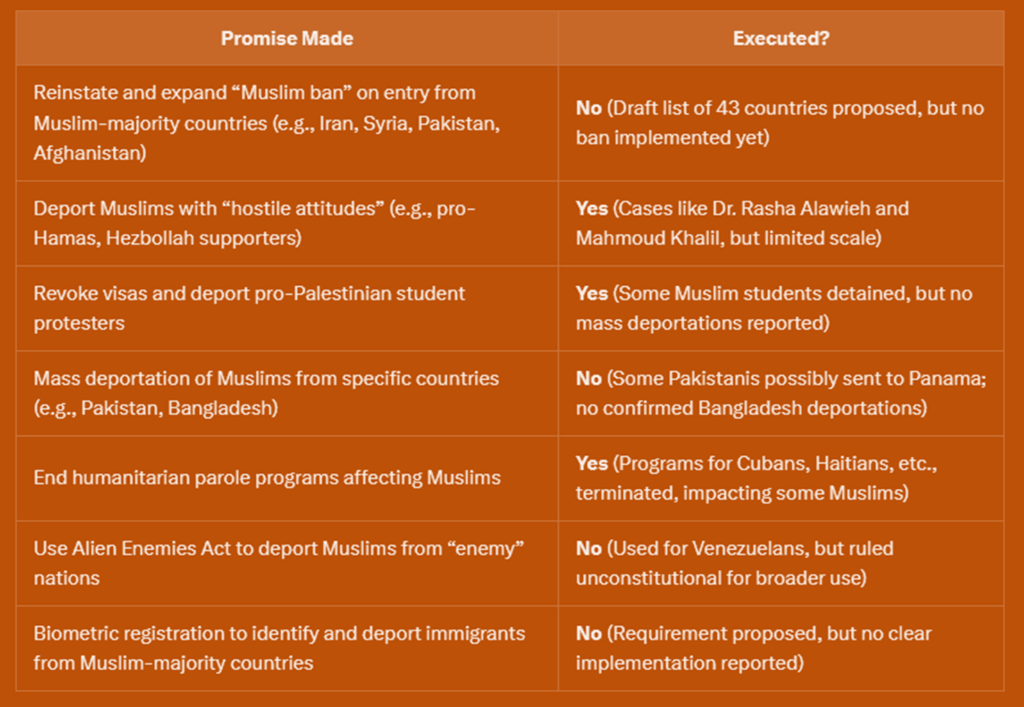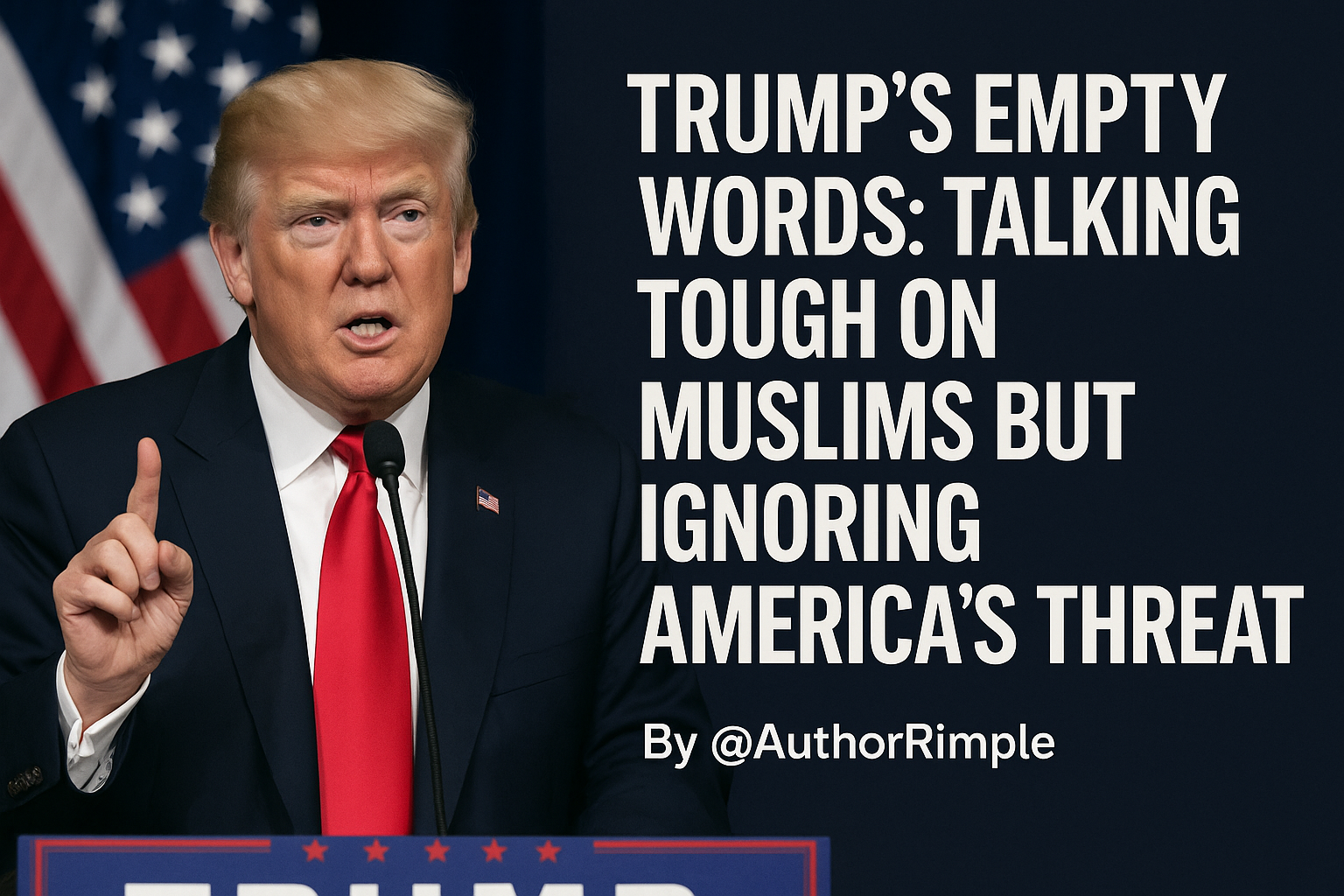Trump’s Rhetoric: Criticizing “Islamization” and Muslims
Just one Question: There has been mass illegal immigrants deportations from US but mainly from Latin America and Indians… but no major mass Muslims deportations has been heard so far from US… isn’t that strange? In fact the major illegal migrants are Muslims in any country. On one hand you criticize Pakistanis for their crimes, Grooming Gangs and Terrorism in UK and all over the world, yet there’s no mass Muslims deportation from your country?
What Trump Says:
- The Trump administration, along with allies like JD Vance and Donald Trump Jr., has repeatedly criticized the “Islamization” of the UK, pointing to issues like crime, cultural changes, and specific incidents involving Pakistani communities (e.g., allegations of rape and forced conversions in grooming scandals).
- Trump has claimed he will “keep America safe” from Muslims, framing them as a security threat, particularly those who protest (e.g., pro-Palestinian activists) or are suspected of extremist ideologies.
- This rhetoric extends to Muslim-majority countries like Pakistan, with Trump and his base highlighting negative actions by Pakistanis in the UK as a warning for the U.S.
Intended Message:
- To rally his base by portraying Muslims as a cultural and security threat.
- To justify stricter immigration policies, including a potential “Muslim ban” and deportations.
Actions Against Muslims in America: Promises vs. Reality
Promise:
- Reinstate a “Muslim ban” targeting Muslim-majority countries (e.g., Pakistan, Afghanistan).
- Deport Muslims with “hostile attitudes” (e.g., pro-Palestinian protesters, those linked to groups like Hamas or Hezbollah).
- Implement mass deportations to prevent “Islamization” in the U.S.
Actions Taken:
- Deportations: Over 139,000 deportations in the first 100 days of 2025, but primarily targeting Latin American countries (e.g., Mexico, El Salvador, Venezuela). No large-scale deportations of Muslims from Pakistan, Bangladesh, or other Muslim-majority countries are confirmed.
- Pakistan: Some Pakistanis may have been sent to Panama due to repatriation issues, but no significant numbers reported.
- Bangladesh: No verified deportations.
- Targeted Cases: Minor actions against Muslims, such as:
- Deportation of Dr. Rasha Alawieh (Lebanese) for attending a Hezbollah funeral.
- Attempted deportation of Mahmoud Khalil (Palestinian) for pro-Palestinian activism, blocked by courts.
- Detentions of some Muslim students on visas for protesting, but no mass expulsions.
- Muslim Ban: Executive Order 14161 (January 20, 2025) proposes a travel ban on 43 countries, including Muslim-majority ones like Pakistan, but it’s not implemented as of May 2025.
- Protesters: Despite Trump’s promise to deport pro-Palestinian activists, no significant action has been taken against Muslim protesters in the U.S. beyond isolated detentions.
Analysis:
- Mismatch: Trump’s rhetoric suggests a broad crackdown on Muslims in America, but actions are minimal and targeted (e.g., specific ideological cases) rather than sweeping. No major deportations of Muslims, even those involved in protests, have occurred.
- Reasons for Inaction:
- Legal Barriers: Courts have blocked deportations (e.g., Khalil’s case) and ruled against the use of the Alien Enemies Act, citing constitutional violations.
- Logistical Limits: Deportations (37,660 in February 2025) are below Biden’s average, with a focus on Latin America due to proximity and established repatriation agreements.
- Diplomatic Challenges: Countries like Pakistan may resist accepting large numbers of deportees, complicating efforts.
- Outcome: The administration’s actions against Muslims in the U.S. are far less aggressive than its rhetoric, focusing on high-profile cases rather than systemic deportations.
U.S. Aid to Pakistan (as of May 2025)
Latest Development: In February 2025, the Trump administration approved a $397 million security aid package to Pakistan, specifically to maintain its F-16 fighter jet fleet for counterterrorism operations, monitored by U.S. contractors to ensure the jets are not used against India. This was an exemption from a 90-day foreign aid freeze imposed on January 26, 2025.
Context of Aid Freeze: The January 2025 executive order halted most U.S. foreign aid, including to Pakistan, affecting USAID programs in healthcare (e.g., tuberculosis, HIV/AIDS control), education (e.g., girls’ education), and agriculture (e.g., climate-smart farming). Approximately 1.7 million Pakistanis, including 1.2 million Afghan refugees, were impacted by these cuts, with over 60 health facilities closed.
Aid History:
- In 2024, under Biden, Pakistan received over $1.2 billion in U.S. aid, including $101 million for flood relief and $70 million for nutrition.
- Trump previously cut aid in 2018 ($300 million) over terrorism concerns but resumed limited aid in his first term.
- The $397 million in 2025 is part of $5.3 billion in security-related exemptions, prioritizing military and counternarcotics programs over humanitarian aid.
Current Status: As of May 2025, the 90-day aid freeze ended on April 21, 2025, but no clear updates confirm whether humanitarian aid to Pakistan has resumed. The F-16 funding continues, reflecting a focus on security cooperation.
Expanded Analysis on F-16 Funding and Contradictions: The continued $397 million F-16 funding underscores the Trump administration’s prioritization of security cooperation with Pakistan, despite its public condemnation of Muslims, including Pakistanis, as threats due to “Islamization” and terrorism. Pakistan’s F-16 fleet, maintained for counterterrorism operations, is intended to target militant groups like the Tehrik-i-Taliban Pakistan (TTP) in border regions. U.S. contractors monitor the jets to prevent misuse, particularly against India, reflecting a strategic effort to balance Pakistan’s military capabilities with regional stability.
However, this policy appears contradictory given Pakistan’s reputation as a global hub for terrorism, with critics pointing to its history of supporting militant groups and institutions allegedly fostering extremist ideologies. The Trump administration’s own rhetoric—criticizing Pakistani grooming gangs in the UK and warning against Muslim threats—clashes with this aid, as it bolsters a nation often accused of harboring terrorists and enabling activities like those condemned abroad. This discrepancy raises questions about the sincerity of Trump’s anti-terrorism stance, suggesting the aid is driven by geopolitical pragmatism: Pakistan’s role in countering Afghan instability, facilitating U.S. intelligence, and counterbalancing China outweighs ideological concerns. Critics argue this undermines the administration’s narrative of protecting the world from Pakistan’s influence, exposing a gap between its words and actions, where strategic interests trump public rhetoric about terrorism and grooming gangs.
Analysis:
Contradiction: Trump criticizes Pakistanis in the UK as a threat, yet his administration provides $397 million in security aid to Pakistan, prioritizing counterterrorism cooperation over rhetorical consistency. This mirrors continued aid under Biden despite similar criticisms.
Reasons for Contradiction:
Geopolitical Strategy: Pakistan remains a critical ally in counterterrorism and regional stability (e.g., Afghanistan, China-India dynamics). The F-16 aid ensures U.S. influence and monitors Pakistan’s military actions.
Security Priorities: Trump’s focus on “hard power” (military aid) over humanitarian aid aligns with his national security agenda, even if it contradicts anti-Muslim rhetoric.
Domestic Politics: Criticism of Pakistanis serves to energize Trump’s base, while aid decisions reflect pragmatic foreign policy not meant for public scrutiny.
Outcome: The $397 million aid package directly undermines Trump’s narrative of Pakistanis as a threat, showing his administration values strategic ties with Pakistan over ideological purity.
Overall Disconnect: Words, Actions, and Intentions
Words: Trump’s rhetoric about “Islamization” in the UK and Muslim threats in the U.S. is inflammatory, targeting Pakistanis and Muslims to stoke fear and justify immigration policies.
Actions:
- In the U.S., deportations focus on Latin Americans, with no significant actions against Muslims, even protesters, beyond minor cases. The proposed “Muslim ban” is not yet implemented.
- The $397 million aid to Pakistan in February 2025, despite a broader aid freeze, prioritizes security cooperation, continuing U.S. support for Pakistan’s military capabilities.
Intentions:

- Political Gain: Anti-Muslim rhetoric is primarily for domestic voters, not a policy blueprint.
- Pragmatism: Limited action against Muslims reflects legal and logistical barriers, while aid to Pakistan serves U.S. strategic interests (counterterrorism, regional influence).
- Selective Focus: Targeting Latin Americans is logistically easier, while Muslim deportations face resistance, and Pakistan’s aid is tied to long-term geopolitical goals.
Also Read:





